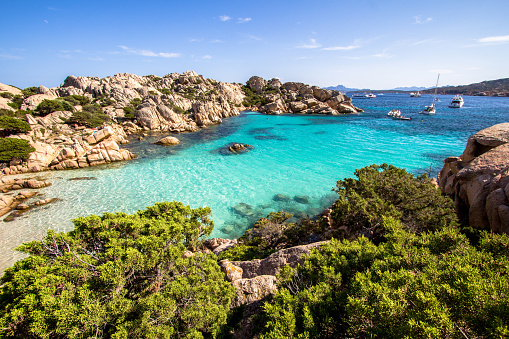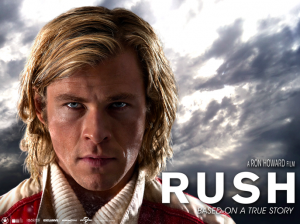by Jennifer Anthony
I proved that I would never be a rocket scientist when I was thirteen years old. My English class had just finished reading Orwell’s barely futuristic masterpiece and the test question was meant to be a giveaway, really. What year does this book take place? it read. I scribbled in the current year: 1983.
It was a dark day for my teacher.
Since then I have done innumerable stupid things. One of my most recent and stunningly foolish maneuvers was locking the keys in the car on a beach in Sardinia. Yet since the days of the Orwellian disaster, I have learned that the sublime can result from the ridiculous-as this would be the event that would reveal true Italian charm to me.
It was August and hot-even hotter than it had been in Rome, but there, on the northeastern coast of Sardinia, with a breeze rolling off the Mediterranean and the sea that electric turquoise that I feared I’d only see on the glossy cover of Condé Naste, we embraced the heat, let it roll over us in hazy waves, lifted our faces to it like dogs hanging their snouts out a car window.
We was me and Stefano, the Roman I’d met on a solo trip to Italy five months earlier. I’d come back to spend two weeks with him in his hometown and in brash, bold Sicily’s quiet, mysterious cousin, Sardinia. Northern Sardinia, with its rugged, rocky inland, home to sheepherders. And its sea! So dazzling and surreal that I would cut my eyes away, blinking, only able to digest the vista in pieces.
One afternoon, we drove out to Badesi Beach, energized by our morning ritual of a cappuccino and cornetto. It was our fifth day in Sardinia, our fifth beach; we were experts by then, moved as easily together as a couple of twenty years. The food bag his mother had packed and sent along-here. The towel, big enough for two-right over there. We parked our sandals side by side and pushed them, toe first, into the sand. Look, the Italian tourists are doing calisthenics in the shallow end of the ocean! Ah, la dolce vita.
Before I eased myself down onto the sand, I decided to do a quick pat of the backpack, feel for that telltale, crooked lump of keys. Pat, pat. Nothing. Huh. Do you have the keys? I asked Stefano, waiting for a teasing response. No, do you? he’d ask, hiding them in his pocket. That old who’s-got-the-keys game.
But perhaps that was an American game? Because Stefano wasn’t smiling. Just that morning, I’d gushed about him in my journal.
He’s a unicorn of a man, I’d written. Spontaneously serenades me. Calls me bella day and night, even when my hair sticks straight up like a fright wig after a day at the beach. Introduces me as My Love to strangers and friends alike.
And yet, despite the heat and the brilliant blue of the sky and sea, a thundercloud seemed to have formed directly above his head. A frown was deepening into his mouth.
Neither of us had the keys.
But we could not-would not-believe it. We lunged for the backpack, turned it inside out, thrust our hands into the pockets, the crevices, the corners. Nothing. Yanked the towel up, snapped it, hard. Reached into the pockets of our shorts, pushed our fingers into the toes of our sandals. Kicked at the sand.
And repeat.
Nothing.
We looked up at each other. He wasn’t calling me My Love. I couldn’t blame him; at that point I remembered he’d given me the keys to hold.
We gathered most of our belongings and trooped back to the car. Peered through the windows-maybe we’d left it unlocked? But Stefano was from Rome, and having seen a number of people get robbed, he was a stickler for fortifying his car, our bags, ourselves. The car was secure as ever, and the keys were in the trunk.
It was Sunday, and hot, and we were keyless in rugged Sardinia.
On a remote Italian island, Sunday salvation won’t come in the form of a four-wheeled tow truck; there is no AAA. One’s only hope is to allow his or her face to melt into a Venetian mask of despair, and start begging.
Round One.
Panic set in. We marched over to the bar at the far end of the parking lot, which was inhabited by four men. The whites of their eyes shone through the bar’s cave-like darkness. They froze when Stefano explained what had happened. Hands flew into the air; everyone had suggestions. The bartender disappeared into the backroom and reemerged with a giant roll of wire. He snapped off a long piece, twisted one end into a circle as he gave us instructions in rapid-fire Italian. Stefano and I headed back to the car. We wedged the door ajar with a chunk of wood, slipped the wire in.
Just then a middle-aged man appeared out of nowhere, offered to help. He shook his head and tsk-tsked us-No, no! when he saw that we had wedged the plank of wood into the door. Evidently that was not the right way to do it. I was asked to go fetch the umbrella from the beach. When I returned, Stefano and the man, grunting in solidarity, set about snapping off one of the umbrella’s poles. And then, after looking left to right and left again in search of-whom, the cops?-the man slipped the pole down into the car and began shoving it up and down with great fervor. As sweat rolled down his brow, I noticed he looked almost-practiced. But not practiced enough. After about ten minutes of this, he shrugged, mumbled mi dispiace, and ambled away to his wife, who sat waiting in their idling car. I stood in awe that this man would hop out of his car to assist a stranger in the heat of the day.
Round Two.
We asked for help from a cluster of white-haired men and women who stood chatting in the parking lot. One of the men broke free from the circle, strutted toward us, puffy and proud as a bull. No shirt, thick gold chain, glossy with suntan oil, his chest the color of my morning cappuccino. He sashayed over, sized up the situation, and said, Ti prometo niente-I promise you nothing. He slid the plank of wood back into the door, talked with one hand while he slowly, ever so slowly, pulled the wire up with the other. He justified his lethargy: I don’t have much energy because my wife wore me out last night. Chuckles all around. And then he spoke of his hometown, inquired about Stefano’s. Chatting, chatting, often forgetting that he was supposed to be trying to open the door. After long, fruitless minutes, his wife snapped at him from the other side of the car: Basta, enough talking! She fetched a handful of mysterious tools from their car a few slots down, tried shoving them into every lock and crevice of Stefano’s car. Finally, defeated, they too said mi dispiace, and left. We were still keyless but they had made us laugh, there in the parking lot where the heat undulated up from the asphalt and the music, wafting over from the water aerobics, seemed to mock us.
Round Three.
Three young men approached the car parked beside Stefano’s, eying us suspiciously, wondering, no doubt, why we were lurking there, and anxious about the various wires, poles, and tools that were coming dangerously close to their car. Stefano explained. They dropped their bags on the ground, got to work. The driver of the other car and Stefano collaborated-Stefano with the umbrella pole, the other man with the wire. The friends stood directly behind them, watching, breathing down their necks, commenting. The guilty party (me) stood on the other side of the car, staring through the window and thinking hopeful thoughts.
At last, we heard the celestial click of the lock, rising. They moved to open the door. It wouldn’t budge. I thought back to the first man who’d helped us, his vigorous slamming with the umbrella pole. They persisted. Finally, after a considerable amount of shoving, they got the door open. The five of us breathed a synchronized sigh of relief. We offered them a drink at the bar. The four men had sodas; I nursed a beer. And then they went on their way, business as usual, and Stefano and I headed back to the beach. As we floated like content manatees in the surf, Stefano apologized: I am sorry for being cross, My Love. Niente, I responded. Ti amo.
I never did become a rocket scientist. But in spite of that, or maybe because of it, I have learned to find the positive in the most ridiculous of situations.
I’ll take resilience over brilliance.
* * * *
To book a ferry from Civitavecchia on mainland Italy to Olbia in Northern Sardinia:
www.tirrenia.it
For more information on Sardinia, visit
www.sardegna.com
* * * *
Jennifer Anthony is a native Californian. Italy was the destination of her first solo trip abroad, and she’s been hooked on solo travel every since.





